
 |
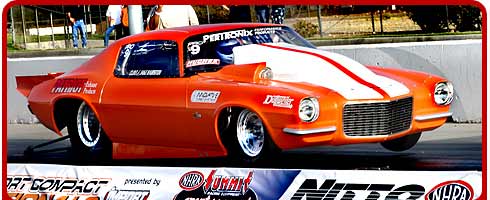 |
 |
by Darr Hawthorne
Photos by Zak Hawthorne and Reflections of Motorsports (PSCA)
6/1/04
![]() he
Pacific Street Car Association came to California Dragway in Fontana, California
for the first time with the California Street Car Nationals.
he
Pacific Street Car Association came to California Dragway in Fontana, California
for the first time with the California Street Car Nationals.
In PSCA there’s a class for just about any kind of muscle car combination from the all-out, tube chassised Pro Street with speeds over 200 mph to Xtreme Street to True Street eight classes in all and a couple of index and trophy brackets. The “street” designated classes are raced heads-up and the racing is intense with over 220 cars entered at this event. The three-day event, with a Friday test and tune, brought out a large and vocal Saturday crowd standing three deep at the fence for qualifying. In PSCA tradition, Sunday’s crowd was smaller.
A couple of racers I talked with were reformed street racers who are bored with traditional dragstrip bracket and index events and found PSCA to be the only organization promoting heads-up competition on the West Coast. Some of the pits had a strong “street racing” vibe with lots of friends, families, BBQs and enthusiasm supporting strong-running, well-built racecars.
In the Outlaw Street class, Randy Normandin in his ‘69 Camaro left a sleeping No. 1 qualifier Mike Varney on the starting line. Normandin’s Hot Rod Performance-sponsored car ran 8.122 at 168.94 mph on this final run.
Xtreme Street qualifying leader Rick Snaudy’s 1966 Mustang went on to win his category running a best of 7.922 at 176.93 mph over Roger Rydell in his blown ‘67 Chevelle.
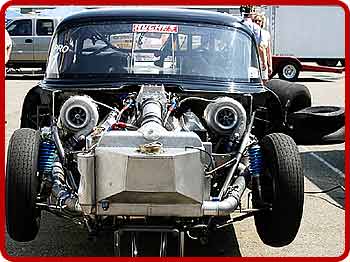 Qualifying in Pro Street was lead by 2003 series champ Ed Thornton’s unique Duttweiler-prepped twin-turbo ‘57 Chevy running 6.827 at 204.98. |
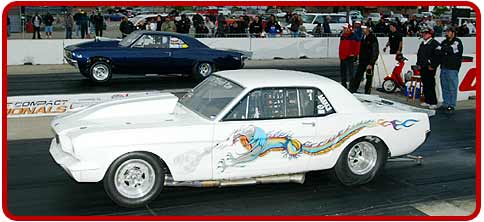
Xtreme Street qualifying leader Rick Snaudy's 1966 Mustang
went on to win his category running a best of 7.922 at 176.93 mph over Roger
Rydell in his blown '67 Chevelle.

| Fast qualifier in Hot Street was Carlsbad’s Carl Gustafson in his cool ‘66 Chevy II running 8.963 at 150.83 mph. Gustafson lost in the semi’s to a hole shot from eventual division winner George Mitchell. | George Raygoza set low e.t. in True Street and won the bracket in his ‘68 Nova. |
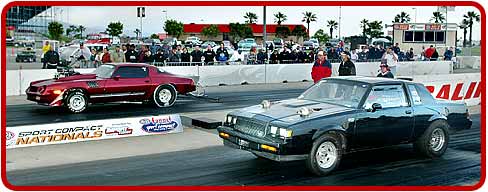
Arizona’s Heath Hairston, driving his blown Heavy
Street ‘67 Camaro, grabbed a hole-shot victory over Christopher Chow running
an 8.517 at 161.48 mph.

Transmission wizard Mike Stewart was on hand to assist his many customers and
helped work out the bugs on fellow Lancaster, CA resident Roger Rydell_s_67
Chevelle. Stewart, a four-time PSCA championship winner, tuned the blown 509
cubic inch machine to a runner-up in Xtreme Street running a best of 8.297.
Tony Kane, with PSCA contingency sponsor Hughes Performance, feels good about their program. “You can run anything here and feel big-time at a small event,” said Kane. Hughes’ involvement has increased their business and opened up potential new markets for the Arizona company. Before joining Hughes, Tony Kane competed in PSCA and is currently building a ‘55 Chevy to battle in Pro Street.
This quick muscle car drag racing series and the Dragway both showed they needed some fine-tuning. PSCA is in its sixth year of competition is under the leadership of series owner and race director Mel Roth.
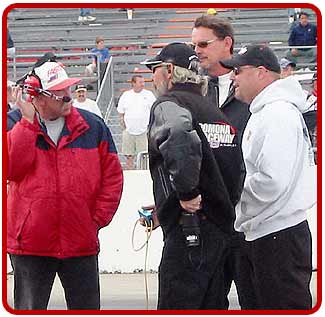
Roth is hands-on (pictured right) managing problems and questions directly from
his vantage point behind the starting line.
I looked forward to the California Street Car Nationals to see some local heads-up drags and was not at all disappointed with the racing. Suggestions from a number of racers that I spoke with were that it is time to bolster the purse money paid by PSCA rather than the majority of money coming from contingency sponsors. Some racers commented on the need for a permanent PSCA starting-line crew since a few competitors questioned the Dragway starter’s activation of the tree, while nothing appeared out of order. A permanent PSCA starter, who knows the series drivers needs and habits, would go a long way to alleviate any confusion.
In its second year of operation, California Dragway, under the leadership of track manager Dave Danish, is shaping up to become a first-class facility very capable of handling national events. However, the Dragway needs to fast forward planned improvements by completing a facilities upgrade including permanent scales since many of the PSCA classes are based upon weight to cubic inch calculations and portable scales are no way for precise measurements.

An additional grandstand and permanent restrooms are now a necessity. But the biggest gripe I found from most spectators was the need for a better-equipped snack bar to handle patrons. Requests for water, sodas, burgers and dogs do not end at 4 p.m., when the racing goes well into the evening. Next door, huge quantities of adult beverages are sold at the speedway on NASCAR and open-wheel dates.
When PSCA returns to California Dragway in the fall, I’ll certainly be
there. It is a first class, heads-up show! ![]()
Copyright 1999-2004, Drag acing Online and Racing Net Source